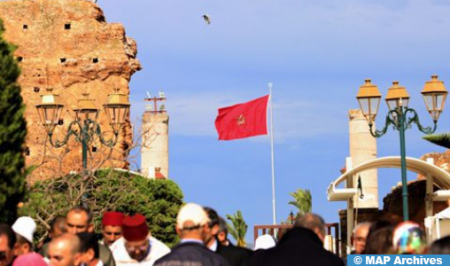Geneva: HRC Adopts Morocco’s Universal Periodic Review Report
The Human Rights Council (HRC) adopted, on Friday in Geneva, Morocco’s Universal Periodic Review (UPR) report, under its fourth cycle. This adoption, which takes place within the framework of the 52nd HRC session, crowns the efforts made by Morocco to promote and protect human rights, but also its positive interaction with the UN human rights mechanisms. During its review, Morocco received 306 recommendations from more than 120 delegations and interacted with all delegations representing all continents, said a statement from the Moroccan delegation. This large number of countries participating in this review indicates the interest of the international community for the reforms implemented by the Kingdom, in accordance with the High Directions of His Majesty King Mohammed VI and concomitantly with other strategic reform projects initiated in the perspective of the New Development Model implementation, the same source said. The adoption of the Kingdom’s report comes at a time when it is serving its third term in the UNHRC, following its re-election with a large majority praising Morocco’s substantial contributions and constructive role in the proceedings of the Council. Morocco has paid particular attention to the examination of the 306 recommendations it has received, which generally converge with the reform dynamic and the orientation of its public policies and programs in the field of human rights. The Secretary General of the Interministerial Delegation for Human Rights Abdelkarim Boujradi stressed, on this occasion, that Morocco’s position with regard to the recommendations is based on two essential rules: The full respect of its commitments, in accordance with international conventions and treaties ratified by the Kingdom and action within the provisions of the Constitution. Within this framework, 232 recommendations have been retained as being implemented or in the process of being implemented, due to their inclusion in the framework of public policies, strategies and programs, particularly those relating to the interaction with the United Nations human rights system, the continued harmonization of the national legal framework with international conventions, the reform of the education and training system, social protection, the strengthening of guarantees against torture, the continued improvement of the condition of detainees, and guarantees for the exercise of freedom of the press, opinion, expression, assembly and association. These recommendations are also related to national policies and programs aimed at advancing collective rights, such as the rights of the child, the rights of persons with disabilities and migrants, equality and women’s rights, human rights education and training, the new development model, the strengthening of the institutional and legal framework for human rights and the consolidation of decentralization. In addition, the Kingdom has taken note of 37 recommendations which are partially accepted in principle and purpose, and which relate to issues under national debate, such as accession to the Rome Statute of the International Criminal Court, the goals of which have already been enshrined in the Constitution, as well as issues related to the death penalty, in accordance with the effective moratorium on the application of the death penalty, which has been in place since 1993. Therefore, the Kingdom’s rejection of the call for immediate action on these two issues reflects a respect for the results of the related national public debate and for their relevant political and social dimensions. In addition, the Kingdom has expressed its partial agreement with a set of complex recommendations, such as those related to discrimination, equality, women and children’s issues. The accepted parts are part of the planned legislative reform of the family code and policies aimed at promoting equality, empowering women and protecting their rights, abolishing underage marriage, protecting the rights and best interests of the child, and ensuring equal enjoyment of economic, social and cultural rights and access to various public facilities and services. However, Morocco expresses its rejection of the remaining parts, as they are in contradiction with the unifying constants of the Moroccan nation as defined by the Constitution and the foundations of the Kingdom’s treaty practice On the other hand, the Kingdom has indicated that it has taken note of 32 recommendations which it considers to be totally rejected. Some are incompatible with the nature of this collaborative mechanism, others do not take into account the ongoing national debate on various issues and the need to prepare material and realistic conditions in this regard, while the rest are in contradiction with the constitutional constants and national identity. Morocco has finally announced that it does not accept five recommendations related to its territorial integrity in the framework of the artificial regional dispute over the Moroccan Sahara, dealt with by the UN Security Council. These recommendations have no relevance to the mandate of the Human Rights Council and are not in line with the basic foundations and principles of the Universal Periodic Review. In keeping with the good practice it has established since the second UPR cycle, Morocco has affirmed its voluntary commitment to submit a mid-term report on the implementation of the recommendations of this fourth cycle of the Universal Periodic Review.

